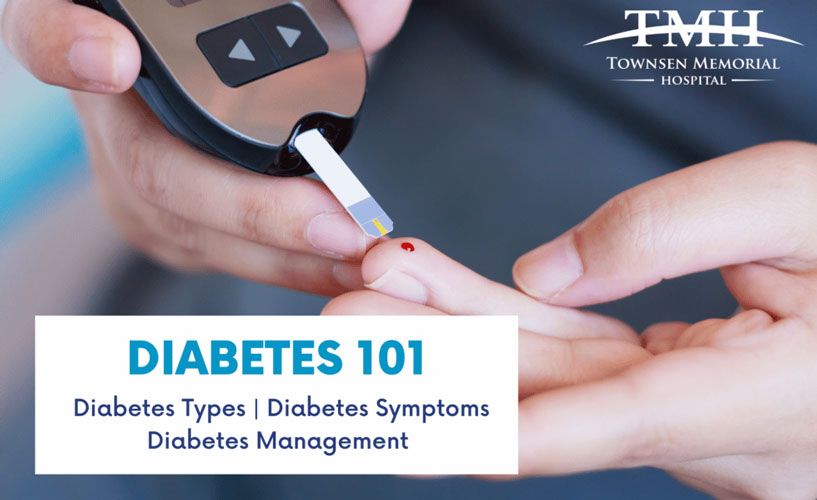Diabetes 101

November is Diabetes Awareness Month. The disease, which affects more than 37 million people in the United States, is as common as one in ten people and is the seventh leading cause of death in the country. Even more staggering than that, according to the CDC, one in five people with diabetes aren’t even aware that they have it. This month, we’ve gathered what you need to know, including pre-diabetes, symptoms, management and more.
What Is Diabetes?
Diabetes is a chronic health condition that directly affects how your body converts food into energy. Most people naturally produce the hormone, insulin, which assists in turning sugar from the food you eat into energy you can use or store for later. In patients with the disease, their body either doesn’t produce its own insulin, or it struggles to use the insulin it does produce. Either way, their blood sugar rises. This elevated blood sugar level can lead to serious health problems over time.
Type 1, Type 2 And Pre-Diabetes
If you know someone with diabetes, you’ve likely heard the terms type one and type two, which describe whether the patient’s body doesn’t produce insulin (type one) or doesn’t use insulin properly (type two). Fortunately for those with type two, the onset of the disease can be delayed or prevented entirely with lifestyle modifications.
If your blood sugar levels are elevated but not elevated enough for a diagnosis, your doctor may diagnose you with pre-diabetes. With this condition, your body may not be able to fully use the insulin you make, or your body may not make enough insulin to keep your blood sugar levels in a healthy range. More than 96 million Americans (one in three people) have pre-diabetes.
Symptoms
If you are experiencing one or more of the following symptoms, reach out to your doctor to have your blood sugar levels tested:
- Frequent Urination, often at night
- Extreme Thirst
- Unexplained Weight Loss
- Severe Hunger cues
- Blurry Vision
- Numb or Tingling Hands or Feet
- Chronic Fatigue
- Very Dry Skin
- Slow to Heal Sores
- Increased Number of Infections
Management
Diabetes is a lifelong disease that can take a toll on a patient’s physical, mental and emotional health. Fortunately, there are things you can do if you’ve been diagnosed with diabetes to improve your quality of life.
- Eat Well: Maintaining a healthy blood sugar is the key to living with this disease. This means eating well, or more aptly put, it means eating healthy foods in the right amounts at the right times so your blood sugar stays in your target range as much as possible. The right diet looks different for every person. At Townsen Memorial Clinics, our doctors can work with you to find the right nutrition plan for your needs.
- Stay Active: Physical activity is important for people with diabetes, as it makes your body more sensitive to insulin. On top of lowering your blood sugar levels, regular physical activity also lowers your risk of heart disease and nerve damage.
- Take Care of Your Mental Health: People with diabetes are more likely to develop depression or anxiety, so be sure you’re regularly taking stock of your mental health and seeking treatment if you need it. Additionally, you may sometimes feel discouraged, frustrated, or tired of dealing with daily diabetes care, like diabetes is controlling you instead of the other way around. This is known as diabetes distress. While it can look like depression or anxiety, it can’t be treated effectively with medicine. Speak to your doctor if you’re experiencing symptoms like skipping insulin or doctors appointments.
The Care You Deserve At Townsen Memorial
At Townsen Memorial, our family of hospitals, clinics and imaging centers are equipped with the latest in medical technology and diabetes management strategies. We strive to provide the best patient experience across all Townsen Memorial affiliated sites. Our standard of high-quality care starts at our Emergency Room and carries on through our Imaging Centers, Surgery Centers, and through our Hospital. Our medical sites are located in Houston, TX and the surrounding areas, to provide the best care to patients in and around Harris County. To learn more, visit our website or call 1-877-494-9487.
